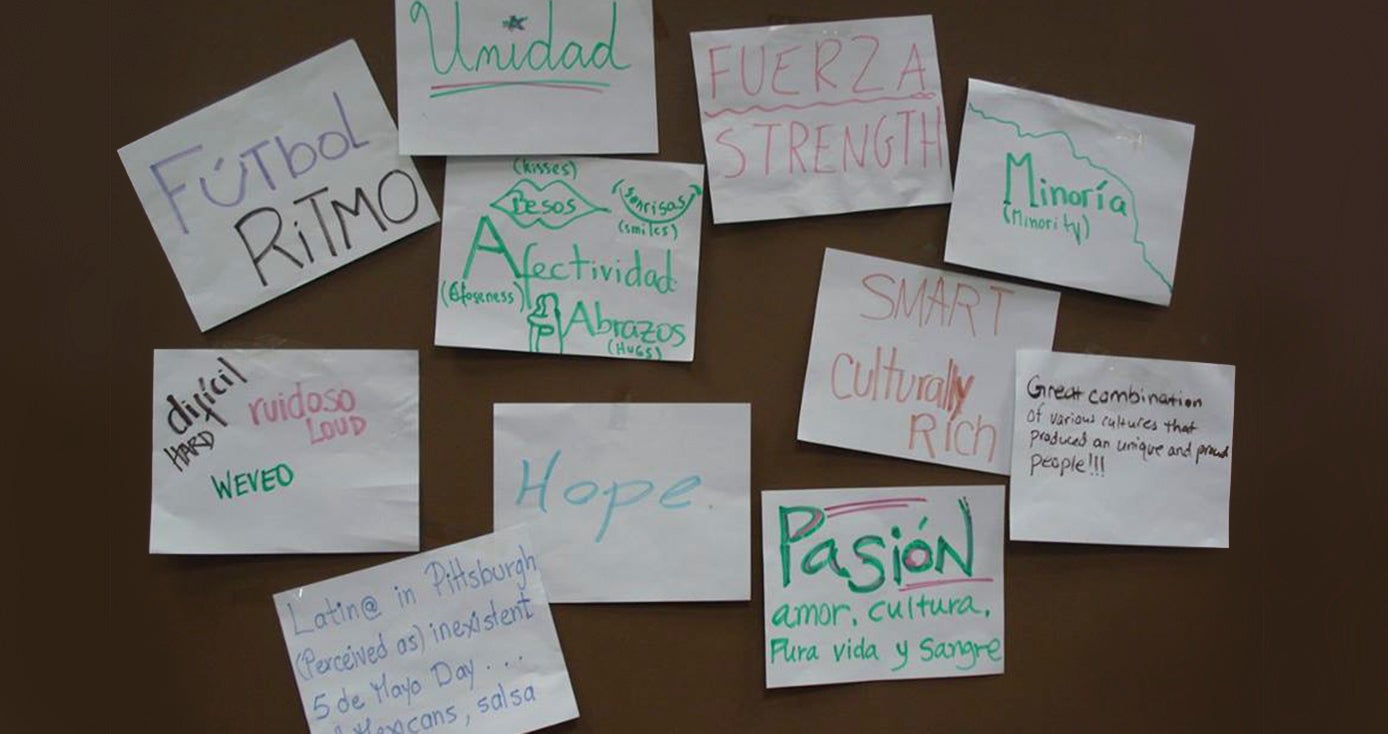
Subscribe to Pittwire Today
Get the most interesting and important stories from the University of Pittsburgh.Graduate Student Organization Celebrates Latino Culture, Builds Relationships
At the first-ever meeting of the Latin American Graduate Organization of Students (LAGOS), organizers posed a set of questions: What is it like to be Latino? What do you think of when you hear Latino/a?
Hope
Unidad (Unity)
Great combination of various cultures that produced a unique and proud people!!!
The responses were displayed at LAGOS' Bienvenida event last spring, which closed out the year and celebrated camaraderie with food, music, dancers, a salsa lesson and a poetry reading.
LAGOS is a student organization at the University of Pittsburgh that raises visibility of and facilitates networking among Hispanic and Latino graduate students, which constitute just about 3 percent of Pitt’s graduate student population. The organization is one of 112 student organizations at the University with an ethnic or a cultural tie.
LAGOS was founded in 2015 by Daniel Jacobson, a PhD student in Pitt’s School of Social Work. Jacobson, who was born in Honduras, was raised in New Jersey in a predominantly white neighborhood where he recalls seeing Confederate flags and hearing the phrase “Go back to your country.” A few minutes from his neighborhood, he felt at ease in a town where half of the residents were Mexican and the other half were Orthodox Jewish.
He found a similar inclusiveness during his undergraduate studies at New York’s Skidmore College and his graduate studies at the University of Pennsylvania, where he was involved in groups like the Hispanic/Latino Alliance for Change and Equity.
Attracted by Pitt’s Center on Race and Social Problems in the School of Social Work and the school’s reputation, Jacobson attended his first classes at the University in 2015. His research addresses rape as it affects gay Latino and Black men.
When he arrived, Jacobson was surprised to learn that Pitt did not have a dedicated physical space primarily for graduate students of diverse backgrounds. He had come across the Caribbean and Latin American Student Association (CLASA), but that organization caters to undergraduate students.
Keen to build up resources for Latin American and Latino graduate students, Jacobson submitted a constitution for LAGOS to the Student Organization Resource Center, which approved the organization’s creation. He collaborated with friends who are graduate students in the School of Education, many of whom are members of LAGOS’ executive board.
The 40-member organization has received support from Colombia en Pittsburgh, a local organization, and the Center for Latin American Studies, part of Pitt’s University Center for International Studies. It is open to any graduate student, regardless of background and including those who are interested in Latin American studies and culture.
LAGOS has collaborated with other organizations that are affiliated with the University, including the Hispanic and Latino Professional Association (HLPA), whose members include faculty and staff.
“Organizations like HLPA and LAGOS are essential because they provide opportunities for Hispanic and Latino staff, faculty and graduate students to have a forum for support, create a sense of family and community, as well as be a resource to the administration when it comes to recruitment and retention and issues of diversity and inclusion,” said Melanie Krugel, assistant director of student recruitment for MBA Admissions at the Joseph M. Katz Graduate School of Business and HLPA’s founder and former president.
LAGOS’ activity offerings so far have included a potluck, a post-election discussion and a celebration of Latinx Heritage Month this September — gatherings that help build companionship and shared experience between participants. ("Latinx" is the gender-neutral term for Latino/a.) There is also a monthly newsletter, tentatively called Estamos, meaning "we're here," in the works. It will highlight achievement of Latinx students on campus, including fellowships, scholarships, publications and grants.
In the future, Jacobson’s hopes to develop that physical space for Pitt’s Latin American and Latino grad students to meet, to share a cup of coffee and just to chat.
“LAGOS hopes to continue to advocate for issues that are particularly salient to the Latinx community at Pitt as well as supporting Latino students by highlighting their achievements and the various ways that they contribute to student life at the University of Pittsburgh,” he said.



